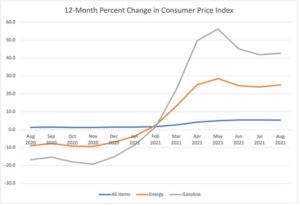President Biden and Democrats are advocating for an 80 percent “clean” energy mix by 2030 and using their reconciliation bill to drive the policy. This is the newest benchmark from a party that has spent years openly calling for the end of traditional energy providers and shaping policies to instead prop up green energy technologies with large subsidies and preferential regulations. Faced with a global energy crisis, however, American families are the ones having to deal with the higher prices exacerbated by liberal policies that discourage production and limit the supply of fuels which are crucial to the U.S. and world economy.
The Democrats’ reconciliation bill doubles down on these policies and would increase energy prices and destroy jobs at a time when Americans can least afford it.
Key Takeaways:
- The Democrat reconciliation bill would worsen America’s energy crisis by limiting our options, raising prices and drastically reducing domestic energy production.
- The bill would also destroy hundreds of thousands of good paying energy jobs.
- The proposal wastes billions of dollars bribing energy suppliers to stop using clean natural gas.
- Biden’s budget increases taxes on domestic oil production by $35 billion, increasing gas prices across the country and heightening our dependence on foreign adversaries
- Despite what he tells the public, President Biden is doing everything he can to raise energy costs.
Clean Electricity Performance Program (CEPP): Adapting the green energy goals of President Biden and the Democratic party for the reality of a reconciliation bill, the CEPP advanced by the House Energy & Commerce Committee forgoes a formal mandate and takes a budgetary carrot-and-stick approach by spending $150 billion on grants for energy suppliers that hit increasing benchmarks for providing “clean electricity” from 2023 to 2030 and fining energy suppliers that fail to meet those benchmarks.
This de facto renewable mandate effectively excludes natural gas as a source of “clean electricity” and would result in the premature closure of fossil fuel plants in favor of expensive investments in new renewable capacity. States like West Virginia – which relies on coal for more than 90 percent of its electricity net generation and has the fourth-largest natural gas reserves in the country – would be devastated by the passage of CEPP. United Mine Workers of America President Cecil Roberts warned about West Virginia that “[a]ll related coal mining and utility jobs would be lost, with severe impacts on families [and] communities …” And following the closure of its eight baseload coal-fired plants in favor of renewables, West Virginia could start to resemble green energy leader California, where the retail price of electricity is currently more than twice as high. More than 42,000 jobs would immediately be at risk.
Methane Fee: The reconciliation bill also proposes building upon the EPA’s Greenhouse Gas Reporting Program by enacting a fee on methane emissions by the oil and gas industry. This punitive fee would cost $1,500 per metric ton released. According to the American Petroleum Institute, the methane fee could cost the economy $9 billion and 90,000 jobs.
Carbon Tax: Top Democrats are also crafting a carbon tax plan that could raise up to $900 billion in new revenue. The explicit goal of a carbon tax is to make fossil fuels more costly, meaning that American families could see higher costs both at the pump and when paying their electric bills at a time when they’re facing rising inflation across the board. Although the consumer price index for all items rose 5.3 percent over the past 12 months, the index for energy rose a staggering 25 percent, reflecting in part natural gas prices that are 150 percent higher than a year ago and gasoline prices that are a dollar more per gallon. At a $15 per ton carbon tax, consumers would face a “modest” increase of 14 cents per gallon of gasoline on top of every other rising cost eating into their savings.

Subsidizing the Wealthy Companies and Chinese Industries: The dichotomy of Democrats’ green energy push is that it simultaneously makes energy less affordable for regular families while going to great lengths to subsidize the wealthy – and ultimately Chinese industries. From electric vehicle tax credits that mostly go to high-income individuals, to tax credits to buy expensive electric bicycles, to residential energy efficient property credits that mostly go to the richest 20 percent of Americans, these provisions represent a wealth transfer from ordinary families to subsidize the well-off. All of these green energy provisions are also dependent on the Chinese-dominated lithium battery industry. And reshaping the American energy landscape to favor renewables would also require massive investments in battery storage in order to maintain the reliability of the electric grid as well as depending on Chinese solar manufacturing.
Oil and Gas Tax Hikes: President Biden’s budget proposal would increase taxes on domestic oil production by $35 billion. As oil prices hit their highest levels in years, President Biden’s plan would reduce domestic production and increase costs. Taken together with the new carbon tax push and Democrats’ subsidies for green energy, it’s clear that the intent is to increase the price of fossil fuels – hurting consumers – and to regulate oil and gas companies – and the jobs that they provide – out of existence.